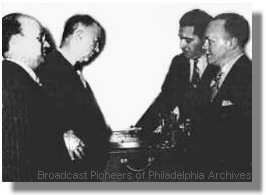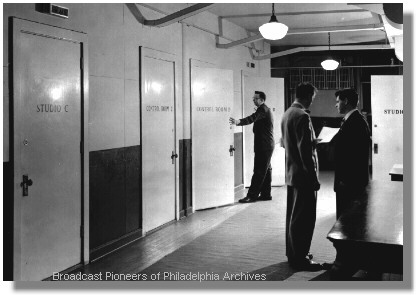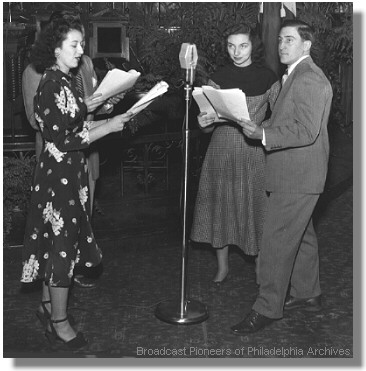

(Left to right) Joseph First, vice president of Triangle Publications
Dr. Robert L. Johnson, president of Temple University
Walter H. Annenberg, editor and publisher of The Philadelphia Inquirer
Roger W. Clipp, general manager of the WFIL stations
WRTI Studios in Thomas Hall (Temple University)
January 22, 1948
![]()
On Thursday, January 22, 1948, a Philadelphia radio station was born. It was the beginning of WRTI. The studios were constructed in the basement of Thomas Hall, previously the Park Avenue Episcopal Methodist Church at Park Avenue and Norris Streets in North Philadelphia. The building which was erected in 1886 was the oldest structure on the Temple campus (predating Baptist Temple by several years). It was the home of WRTI from its beginning in 1948 until 1968 when WRTI-FM moved across the street to the new Annenberg Hall. In 2004, WRTI-FM relocated to new digs at 15th and Cecil B. Moore (Columbia) Avenue.
On that cold Thursday January afternoon, WRTI was only an AM station operating via carrier current (then called a wired-wireless station). The facilities of WRTI from its inception until 1968 were also used to record educational broadcasts for the WFIL radio stations.

(Left to right) Art Eisenberg (Art Lane), John Culver (Temple radio instructor) and Ray Buch
The basement studios of WRTI
Thomas Hall (Temple University)
January 22, 1948
The dedication ceremonies of the WRTI studios were broadcast live over both WFIL & WFIL-FM. Because of this, the activities were fed live to WFIL in the Widener Building in Center City. At least part of the ceremonies was recorded by WFIL. Silent film was also show for airing on WFIL-TV, which came on the air several months earlier. An audio excerpt was dubbed from one 16" transcription disc to another for use on later WFIL newscasts that evening.
So far, we have only found that news sound bite. Thank goodness in 1948, sound bites were much longer than they are today. For that reason, we have a 157 second recording (2:37).
Unfortunately, this recording wasn't in very good condition. Broadcast Pioneers' Board Member Dave Custis (who produced and syndicated the 1980's version of "Your Hit Parade") transferred the audio from the 16" transcription disc to audio tape. Then Broadcast Pioneers' historian Gerry Wilkinson converted it to a digital format. Unfortunately, the audio still wasn't that good. It was almost unlistenable. Fortunately, today's technology allowed us to filter, suppress the noise, reduce the hiss and, basically, clean up the audio to a point where it became fairly clear. The audio cleansing process took five hours of trial and error to come up with what we now have.
The next day, January 23rd, the Philadelphia Inquirer referred to the basement facilities in this way:
The Thomas Hall unit, one of the most complete school installations of its kind in the country, includes two large studios for feature programs and two smaller ones for newscasting and discussions by small groups. There also are four control rooms in addition to a master control room.
It serves the university's new department of Radio, Speech and Theater which was established last September after a $25,000 fund was made available to Temple for that purpose by The Inquirer and Radio Station WFIL.
Dr. Armand L. Hunter, chairman of the Department of Radio, Speech and Theater, arranged the day's program which started with an open house for the students at 1 P.M. At 4:30 a special demonstration program was held and the dedication ceremony began at 5 P.M.
After the dedication, a dinner was held in Mitten Hall, where C.B. Joliffe, executive vice president of the RCA laboratories division, Princeton, was the principal speaker.Dr. Joliffe predicted that television -- "mass communication of sight and sound" -- will in the future "have an enormous effect on the social and political life of our nation."
"Television development," he said, "is now out of the hands of technical men and in the hands of businessmen, educators and entertainers. Television will have its first important part in the political life of our nation during the Presidential election campaigns this year, starting with the televising of the national conventions from Philadelphia."
By the way, the first WRTI (AM) broadcast took place on Monday, March 15, 1948 at 4 pm. It was a test broadcast and was fed to Alpha Sigma Alpha, Delta Sigma Upsilon, Theta Sigma Upsilon, Williams Hall, Thomas Hall and the Radio, Speech and Theater office at 1951 North Broad Street. The transmitter's output power was 40 watts. That was the very first time the transmitter was ever on line. The station was on the air from 1 pm to 8 pm, according to John B. Roberts, former Broadcast Pioneers President and former Temple University Professor. The Swarthmore wired wireless station was on the air before WRTI with the University of Pennsylvania station coming a little while later. These three universities formed a network with each station providing a part of the program schedule, said Roberts.
However, if you accept as a "broadcast," audio being fed from Thomas Hall to Mitten Hall's East Alcove via wire (with no transmitter), then the first regular broadcast was March 1, 1948.
During the dedication of the studios on January 22, 1948, similar wired feeds took place. At 4:30 pm, a transcribed organ recital was "beamed" to the Thomas Hall Auditorium, the main sanctuary of the old church. The auditorium was one floor above the WRTI studios, which were in the basement of the building.
At 5 pm, the formal dedication took place and was "broadcast" including a speech by Dr. Millard E. Gladfelter, then the University's Provost and later Temple President. This was followed by a short musical program followed by 20 minutes of live music featuring a chorus of 30 and an orchestra of 25 students directed by Dave Davis. At 5:40 pm, "Altars of Peace," an original drama based on the Friendship Train was aired on WFIL-FM live.

The drama was written by Temple evening students Amy Faust, Alice Groff and Martin Katz. It was produced and directed by Broadcast Pioneers member (and former President) John Roberts and featured Bob Feldman (Spring 1950 Station Manager) as the narrator, Clair Gomberg and Bill Brown (Fall 1948/Spring 1949 Station manager). Al Sher ran the sound effects truck.

(Left to right) Bill Brown, Al Sher and unidentified male
Thomas Hall Auditorium (Temple University)
"Altars of Peace" broadcast
January 22, 1948
At 6 pm, there was a short dedication speech by current Temple President Robert L. Johnson. The address was carried live on WFIL-FM. This address by Johnson was the excerpt used by WFIL Radio for its evening newscasts.
![]()
This was followed by a five minute newscast presented by Stan Isenberg, WRTI's Station Manager. Then at 6:30 pm, dinner music was "piped in" to the Mitten Hall Club Room where a VIP dinner was being held.
Here's some information about the beginnings of WRTI-FM. Information in the Temple Times, a PR newspaper published by the University dated February 9, 1995, states, "...The station was established in 1948, went on the air as WRTI-FM on October 5, 1953...." However, that date seems to be incorrect. That was actually the date of the beginning of regular, full-length programming. Remember that until 1969, WRTI operated only from October to May, which was the school year. It was off the air during the summer.
However, regular (though logged as "experimental") programming was broadcast daily earlier in the year. Broadcasting Magazine Yearbook of 1973, states that WRTI-FM started on July 9, 1953. This was the date of the original FCC license which hangs on the walls of today's WRTI-FM. It is that date that WRTI uses as its beginning. However, keep in mind that at this time, WRTI and WRTI-FM did not broadcast during July, August or September.

We have found a Western Union telegram from the FCC to the University dated March 7, 1952 authorizing the FM station. The February 15, 1952 issue of Broadcasting magazine shows that the application was filed by Professor John B. Roberts (former President of the Broadcast Pioneers), director of radio on behalf of Temple University. The filing date was February 4, 1952. According to the 1995 article, the frequency was to be assigned at the FCC's discretion. Roberts said in May of 1998 that he now feels that the FM station may have started broadcasting late in 1952. He said, "It's hard to say because of all the tests and sample programs aired on the FM frequency." According to a March 7, 1952 Temple News article, the estimated cost of building the ten watt FM station was $27,513.
A Temple News article dated November 10, 1952 said:
Telephone lines for the University's new FM station are being installed today, announced Berwyn Collentine, radio instructor. The lines will connect the WRTI radio station, basement of Thomas Hall, with the new ten-watt FM transmitter on the twelfth floor of Conwell Hall. According to a WRTI publication, the height of the tower was initially 275 feet high.
A test broadcast (a simulcast of WRTI AM & FM) was conducted later that same day. That would put WRTI-FM's first broadcast as November 10, 1952. According to John Roberts, other WRTI (AM) broadcasts were aired over WRTI-FM during the month of November (1952).
In the October 15, 1956 issue of "On Audition," the weekly WRTI Newsletter, it stated that FM was broadcasting by..."February of 1953. Its hours were erratic, and so were its programs."
On January 22, 1998, WRTI celebrated the 50 years since the dedication ceremonies. The day before, the Broadcast Pioneers of Philadelphia, as part of their luncheon honored WRTI. Broadcast Pioneers member Jerry Klein, the last student station manager and John Roberts, founder of the station spoke. Here's what they said!
What was WRTI-FM's first broadcast? We gave you the facts, and now, you decide (to borrow a line from the Fox News Network).
![]()
From the official archives of the Broadcast Pioneers of Philadelphia
Analog audio transfer by Broadcast Pioneer member Dave Custis
Digitalizing and cleansing of audio by Broadcast Pioneers member Gerry Wilkinson
Top photo & telegram scan originally donated by Broadcast Pioneers member Gerry Wilkinson
Other 3 photos originally donated by Broadcast Pioneers member John Roberts
Special thanks to Broadcast Pioneers member Jerry Klein
© 2009, Broadcast Pioneers of Philadelphia
All Rights Reserved
The e-mail address of the Broadcast Pioneers of Philadelphia is pioneers@broadcastpioneers.com